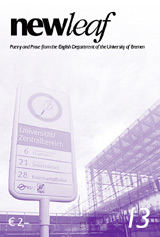editorial

The baker's dozen
is the thirteenth loaf, the one which, according to the Oxford English Dictionary, represents the retailer's profit. If these are the laws of capitalism, then we don't mind producing this thirteenth newleaf purely for our retailer, the University Bookshop in Bremen. At the time of going to print, they are our sole outlet, apart from the trusty band of students under the name of PEM (‘Producing an English Magazine’) who organise lunchtime bookstalls and brave the lion's den of large lectures and seminars to sell newleaf in their rare spare time. The editors would like to take the opportunity of the baker's dozen to thank both these outlets: Karlheinz Winterfeldt and the staff at the Universitätsbuchhandlung; and the PEM students, many of whom have to overcome shyness in front of large groups to do their bit. This is the last semester in which PEM will exist in its present form. Plans are afoot for an editorial and management board as our back-up. This move is linked not only to staff changes in the department but also to a generation change in the students writing and working for newleaf.
The time has now come to re-think our distribution, simply because too many people outside the university who are interested in newleaf don't have regular access to it. And because too many freebees are being sent to large Bermuda triangles all over the country with addresses like ‘Geschäftsführung, Institut für Anglistik’. We have sent the magazine to every English Department in Germany in the hope that it would be put in the library for students of English to read, or at least passed on to colleagues teaching creative writing. But we hear increasingly from these colleagues that newleaf just doesn't reach them. And never have we had feedback from such an address along the lines of Thank you for the magazine. So no more Mr Nice Guy. Some of the people actually involved in promoting student writing, on the other hand, never tire of telling us that they would be prepared to pay for the magazine and ask why it is not possible to subscribe. Up to now, the answer has been two-fold: the work involved, and the fact that we are terribly constrained by the restrictions of the university's financial arrangements, still very strongly based on the City Parks and Cemeteries Department rather than those of an international scholarly institution. As we go to print, PEM is working on both new city bookshop outlets and the possibility of organising a subscription system. For this we need feedback from you, the newleaf reader. We'd like you to contact us and let us know if you would be interested in subscribing to newleaf. Just do it.
Who's afraid of newleaf?
Again and again, students tell us that they write in English, but they also seem to like to stress that, ‘of course my stuff isn't good enough for newleaf.’ So the good news is that the magazine has a reputation for quality writing; the bad news is that the people it was originally conceived for are getting scared of it. In these lines we would like to stress what we tell students in the situation described above: don't believe that the texts you read in these pages were all written in the almost perfect state you find them in. Actually a small minority are; but most of them go through a stringent process of editing, by both PEM and the two editors - plus the authors themselves. Our policy is easy to define. First, each text should retain its original character. Second, no change should be made without the permission of the author. Third, the text should be free of the errors inherent in writing in a foreign language. (Why, for heaven's sake, embarrass ourselves and the author by including tense mistakes in a magazine that gets read all over Europe?) Added to this, fourth, the editor's pencil which every good magazine should keep sharpened is active all the time, usually cutting out redundant or extraneous words. Most often, authors respond positively to these cuts. So send us stuff, please. It is all welcome. Our website contains our 'Guidelines for Submissions'.
The black-and-white illustrations of students concentrating in lectures are by Manuela Finter, who studies Art and German at Bremen.
It is slightly ironic that, having said the above, we should produce a new newleaf which has an above-average number of pages dedicated to two long texts by international native-speaker guest authors. But that's just the way the biscuit dissolves. These stories were just too damned good not to be in. There are no token locals. But you will, we hope, note that # 13 includes texts by four brand new leaves. We rest our case. Enjoy.
Simon Makhali and Ian Watson, May 2002
contents
-
Siren
-
Liverpool Suite
-
Another Little Red Riding Hood
-
'So I leave you now'
-
Puddle
-
In the Mirror
-
Lucas
-
the tarantula
phoenix
lines
-
Zulu Watercat (Part One)
-
Thrush Lawn
Nuthatch
Bird's View
